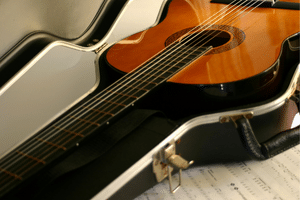
Do your know how to store a guitar correctly and why proper storage is essential? No matter how much your guitar is worth, it’s critical to protect it during daily use or when it’s in long-term storage.
This article reveals the things you must do and mistakes to avoid for keeping your guitar looking, playing, and sounding at its best!
You can use the table of contents below to take you to the area that interests you. Click on the little box to open it and then click on the section of the article you want to read, or you can read from start to finish if you want the full guitar storage experience!

Why Proper Guitar Storage Is Essential!
Guitar “storage” can mean various things, from keeping your daily player on a floor stand to putting a vintage collectible axe away for the long haul.
Maybe in 6th or 7th grade, the first guitar I got was a Sears Silvertone (made by Danelectro) Jazzmaster copy with DeArmond Gold Foil pickups. The guitar came in a cardboard box and a felt-lined thin canvas gig bag.
I thought that cheap gig bag made my guitar bulletproof, but then again, I had never even heard of a Fender Jazzmaster and thought I had purchased an all-original beauty. Somehow, I took that guitar everywhere, but the gig bag protected it from even a single scratch.
Today, I would never store one of my guitars in a cheap gig bag, even if it never left the house.
Your guitar has specific storage requirements, depending on the individual instrument and circumstances. Understanding what to do and avoid is crucial to keep it in the best possible condition!
Even if you play your guitar, it is technically being “stored” while you are not using it. Therefore you can think of a guitar as being in “frequent-use” and “long-term” storage.

Frequent-Use Storage Checklist
- Keep guitar easily accessible in a case, on a stand, or wall hanger
- Do not leave the guitar in unsafe positions, like balanced on an amplifier
- Keep room temperature between 66-77 °F (19-25 °C) with 40-50 percent humidity.
- Avoid exposure to direct sunlight and drafts
- Keep guitar out of direct sight through windows if theft is an issue

Long-Term Storage Checklist
- Guitar display case ok, lock it if guitar is valuable
- Clean the guitar before storing it
- Tune down ½ to 1 whole step to loosen tension on neck
- Put inside a hardshell case
- Mark case with ID tag and place identifying info inside
- Photograph each guitar and record the serial number and ownership history
- Wrap case in canvas or plastic or put in plastic bag if moisture is an issue
- Keep guitars on shelving, high enough up for flood protection
- Store in laying down flat with nothing on top of it or alongside other guitar cases
- Environmentally-controlled room: light, temperature, & humidity is critical – Ideally at 66-77 °F (19-25 °C) with 40-50 percent humidity
- Use a case humidifier for acoustic guitars
- Inspect and play the guitar routinely to ensure it is in good condition
- Commercial storage facilities need theft and damage insurance

Advantages Of Proper Storage
- Allows collection of many guitars
- Maintains or increases the guitar’s value
- Keeps guitar from being damaged and in top playing condition
- Protects guitar from theft

Signs Of Improper Storage
- Damaged finish
- Warped neck
- Rusted hardware and electronics (electric guitars)
- Bridge separating from body (acoustic guitars)
Keep On Reading To Learn More About Each Topic
What Is The Best Way To Store Your Guitar?
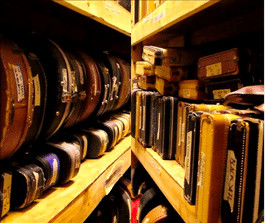
The safest way to store your guitar is in a hardshell case, locked if necessary. The case keeps it physically protected and dust-free.
If the guitar is a “daily player,” keeping it on a floor tripod-stand or hanging it on the wall is more convenient, especially if you play it throughout the day.
Keep it in the middle of the room, away from uncovered windows, direct sunlight, and drafts.
Long-term storage requirements are more demanding, especially if it is an expensive instrument. Keep on reading to learn more.
Is It OK To Leave The Guitar On A Stand?
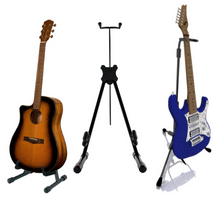
The answer depends on the guitar’s value, the quality of the stand, and your circumstances.
I keep all my guitars on floor stands to make them conveniently accessible. I have some expensive vintage and custom shop instruments but nothing of outrageous value.
Get a high-quality stand that won’t tip over easily and has padding at the guitar’s body and neck contact points. You don’t want the padding to rub off or discolor the guitar over time.
If you have small children or pets, you might be better off hanging them up on the wall and out of harm’s way.

Is It OK To Hang Guitars By The Neck?
Hanging a guitar by its headstock won’t damage the neck or any other part of the instrument, as long as you use a high-quality and properly designed hanger.
A guitar’s neck is made of solid wood, and the vast majority of them have a truss rod to withstand the tension of the strings.
Installing the hanger is just as important as what you use to hang the guitar on. Make sure that you screw the hanger into a wall stud or use proper size anchor screws to support the guitar’s weight adequately.
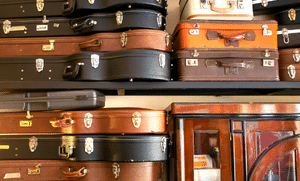
Should Guitars Be Stored Flat?
It doesn’t matter if you store the guitar lying down flat or standing up, especially if it’s in a hardshell case, as long as nothing is resting on top of it.
Ideally, it’s never a good idea to store guitars in their cases, one on top of each other. Their weight can deform a case and cause damage to the contents inside, like moisture damage or neck warpage.
It’s better to put them side-by-side on sturdy shelving, even though it may not be the most space-efficient method.
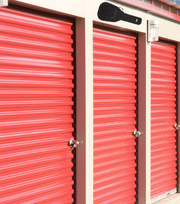
How Do You Store A Guitar Long Term?
I can’t really imagine why you wouldn’t want to play your guitar unless you are a collector or selling vintage instruments is your business.
Most people store a guitar they’re not playing under their bed, in the corner of the back of their bedroom closet, or in their basement or attic. If the guitar has value, then a hardshell case is highly recommended!
Other people store vintage instruments or guitars with sentimental value in locked display cases. This is okay if properly designed to hold the guitar without damaging it.
Music store owners and professional collectors will usually store guitars in a warehouse or storage unit.
No matter where and how well you store them, the look and sound of the guitar will change over the years, but hopefully for the better if everything is done correctly.
It’s not a good idea to stack guitar cases one on top of the other. The weight of the guitars and cases can create a problem over time.
Mark the outside of each case with an ID tag to show the guitar’s make, model, and year. Put a document inside the case pocket with the same info and any important history, including the price paid.
Take complete photographs of the guitar and record the serial number and ownership history to keep in a different location.
Never store the guitar on the floor. Keep it elevated on a shelf or rack for protection against flooding.
If you rent a commercial storage space or unit, ensure the area is secure, and the owner has theft and damage insurance.
It’s a good idea to create a schedule to visually inspect and play each guitar you store to ensure it is not having any issues with case integrity, wood, hardware, electronics, playability, and sound.
Storage Temperature And Humidity Are Important!

The temperature and humidity will be crucial determinants of how well your guitar will fare over the years, especially in long-term storage!
Acoustic guitars are generally more susceptible to climate variations than electrics.
The wood of an improperly stored guitar can absorb moisture, even if it has a polyurethane or nitrocellulose coating.
Fluctuations in temperature can cause the wood to crack and warp. Moisture and mold can wreak havoc on a guitar’s electronics.
According to Fender, the ideal temperature range for storage is 66-77 °F (19-25 °C) with an ideal humidity of 40-50 percent.
Even if your guitar doesn’t appear to be damaged, improper climate control can affect how it plays and sounds. Always pay close attention to climate conditions when storing a guitar!
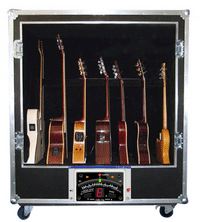
What About Tuning During Storage?
If you are actively playing the guitar (frequent-use storage), then it is unnecessary to detune it when it is not being used.
Detuning to lower the tension on a guitar’s neck during long-term storage is somewhat controversial.
Most guitar makers and players seem to agree that if you’re putting an instrument in long-term storage for six months or longer, especially acoustic guitars, you should lower the tuning ½ to 1 whole step.
Leaving the guitar tuned down won’t cause any permanent damage but could cause the neck to back-bow slightly due to the decreased string tension. This is not usually visibly noticeable with causal inspection but can affect how the guitar plays.
In this case, I recommend installing a new set of strings and bringing the guitar up to pitch. Within several days the guitar neck should adequately readjust itself. If the problem persists, the neck will require an evaluation by a professional and probably a truss rod adjustment.
Do not attempt to adjust the truss rod if you don’t have the proper experience, or you could permanently damage the guitar.
For more info, see How To Keep An Electric Guitar In Tune.

Beware Of Unstable Situations!
One reason I wrote this article on how to store your guitar is because it never ceases to amaze me how some guitar players put their instruments down!
How often have you seen guitar players lean their instrument up against their amp, a chair, or anything else convenient?
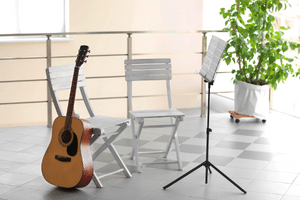
It makes me cringe, and I want to run up and rescue the instrument from a pending disaster!
If I’m speaking directly to you, please don’t make your storage solution precarious!
When you’re not using your guitar, store it safely by placing it back in the case or supporting it properly on a stand or wall hanger.
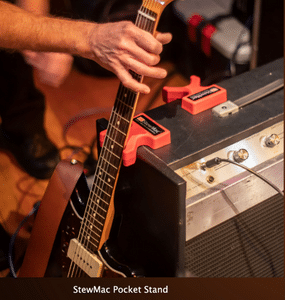
Certain guitars are particularly prone to damage if they fall. For example, heavy electrics, like a Les Paul, or guitars with delicate neck joints, like a Gibson SG.
I can’t even count the number of broken neck joints or damaged headstocks I’ve repaired from unnecessary fall damage. I accidentally snapped the neck off a Les Paul copy after it came unhooked from its guitar strap.
Get an amp pocket stand if you play on stage and like to lean your guitar up against your amplifier. Stewart MacDonald makes a great one! You can also keep a tripod-stand alongside your amp and use that instead.
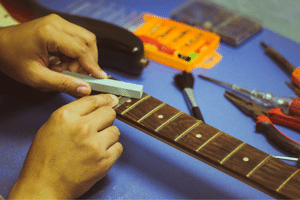
Are You Qualified To Make Guitar Adjustments Or Modifications?
It’s great to work on your guitars, especially if you have a lot of them, but you should always be aware of your limitations.
Adjusting things like an electric guitar’s string height (action) or pickup height can be straightforward. Still, some adjustments require the proper training and experience, like adjusting a guitar’s truss rod.
When you doubt your ability to adjust, repair, or modify your guitar, it’s always best to bring it to a competent guitar technician or luthier (guitar designer & builder). You can permanently damage your guitar, and it might never play and sound right again!
Making modifications to your guitar can void its manufacturer’s warranty and cause permanent damage to the instrument. Certain modifications are irreversible, so you may be stuck with them, even if you desperately want to restore the guitar to its original condition!
I learned that the hard way over the years until I did a three-year apprenticeship in a guitar repair shop. Now I have my own home workshop with the proper training and equipment to safely maintain and repair all my instruments.
Remember: “When In Doubt, Send It Out!”

Frequently Asked Questions
Here are some of the questions I get asked about how to properly store your guitar and other aspects of its care.
If your question does not appear here, please put it in the comments, and I will get right back to you with an answer.
How Do You Store A Guitar In A Small Apartment?
If space is an issue and you play the guitar frequently, hanging it on the will with a proper guitar hanger is probably your best bet. If you’re not playing it, store it in its case and put it in a closet or under the bed. Do not pile other things on top of it.
Can You Store A Guitar In A Plastic Bag?
Putting your guitar in a plastic bag is far from ideal but ok for short-term storage. You can buy a cheap gig bag online that will offer you more protection for your guitar. For longer-term storage, put a plastic bag over the gig bag or get a hardshell case, which is your best option.
When you buy a guitar, you can ask the store salesperson to throw in a free gig bag as part of the deal. For more info, see Buying A Guitar In A Guitar Store – Best Tips And Tricks! and Online Guitar Shopping – The Good, The Bad, And The Ugly!
Is It OK To Store Guitars In The Basement?
You need to be careful when storing your guitar in the basement (or attic) for long time periods. Make sure that your basement has the proper temperature and humidity, year-round, especially if it is an unfinished basement. Mold and pests, like mice, can also be a problem.
Put your guitar in a hardshell case and seal the case in a large plastic bag. Place the guitar on a shelf to guard against potential flooding.
Take the guitar out routinely to inspect and play it. This will help you check for early signs of potential damage to your instrument.
Can You Store A Guitar Without Strings?
Ye, but the best practice is to leave the strings on the guitar and tune them down ½ to 1 whole step. This leaves some tension on the neck to keep it from shifting over time, which might require a truss rod adjustment by a qualified guitar tech.
If you store your guitar for more than 6 to 12 months, I recommend you put on a fresh set of strings before playing it again.
Are Guitars Waterproof?
Absolutely not! Water and excess moisture will damage your guitar! The wood of acoustic guitars will absorb water can quickly become warped. Water will damage the pickups and other electronics of an electric guitar.
Never leave or store your guitar in a place where water or excessive moisture can be a problem. If you take your guitar to the beach, always protect it from water, salt, sand, and high-intensity sun exposure.

Final Thoughts
I hope you found this article on how to store a guitar helpful. Proper guitar storage is essential, even when playing a guitar daily.
Frequently used guitars can be kept out on a tripod-stand, hung on the wall, or kept in a case or gig bag. For long-term storage, a hardshell case is preferable.
If you store your guitar laying flat, be sure not to stack other guitar cases or anything else on top of it.
Temperature and humidity levels are critical to keeping your guitar safe, especially with long-term storage. The ideal temperature range should be 66-77 °F (19-25 °C) with an ideal humidity of 40-50 percent.
You can leave your guitar at standard tuning during long-term storage. Most guitar makers and players recommend tuning down ½ to 1 whole step if you’re putting an instrument in storage for six months or longer.

If your guitar neck needs an adjustment when coming out of long-term storage, do not attempt to adjust the truss rod unless you have the proper training and experience. Take the guitar to a certified technician.

Tell Me What You Think
Please leave a comment below if you enjoyed this article, have any questions about how to store a guitar, or want to give your point of view. I will be happy to help you.
- Do you have a suggestion on how to store a guitar that wasn’t covered in this article?
- In your experience, do you find it necessary to tune a guitar down before storing it?
- What problems have you encountered storing an acoustic or electric guitar?
- After reading this article do you feel more confident handling and storing your guitar?



Hello Frank and thank you for such a well written article! I wish I had run into this article a few years ago as I was searching for several cases to store my daughter’s guitars. It sounds like it is really just up to the discretion or preference of the individual as long as you get the humidity right but is there one of these storage methods you prefer? I’ll make sure and pass this link to my daughter as she has plenty of guitars to store!
Hi, Joseph
Thank You for your comments and question!
Yes, unless you collect rare and expensive guitars, you only need to address the basic issues of guitar storage. Getting the temperature and humidity (especially important for acoustic guitars) correct is always a prime concern!
For everyday use guitars that don’t really leave your home, keeping them in a gig bag, on a guitar stand, or hanging on the wall is fine. If you travel a lot with the guitar or want to put it in long-term storage, I prefer a hardshell case, especially if it is expensive or has sentimental value.
Maybe you should consider getting your own guitar and having your daughter give you a few lessons? It’s great fun, and once you begin, there is no turning back! 😊
Frank
Frank, Thank you so much, for your article on proper guitar storage. I love playing guitar, and always wondered if there was a better way that I should be doing things, when it comes to storing them.
I really loved your exact and concise instructions, and through your shared knowledge here I feel I trust you when you say “Keep room temperature between 66-77 °F (19-25 °C) with 40-50 percent humidity.” and will do set this in the music room to keep my guitars safe, Thank you again.
Hi, Randi
Thank You for your comments!
I’m thrilled that you found my article valuable! It’s always great to correspond with another guitar player.
Much of what you have to know about keeping a guitar in good condition is common sense, but long-term storage can require some special accommodations, depending on what type of guitar you have and its relative value.
I hope you will return to revisit my site.
Keep on playing!
Frank